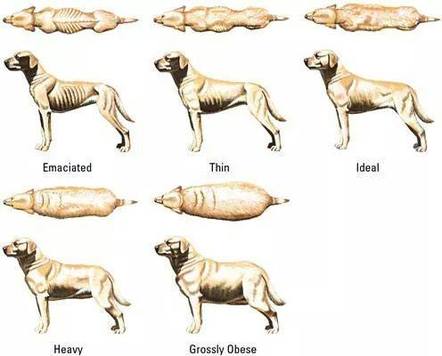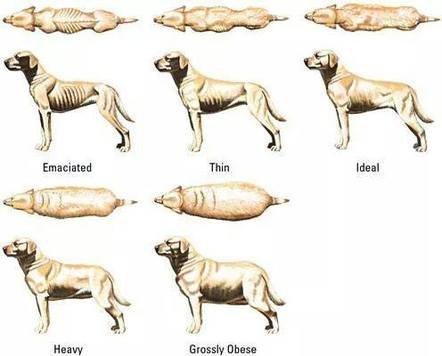Is your Rhodesian Ridgeback looking a bit too slim? Are you wondering if your furry friend is a little on the skinny side? Well, fret not! We’re here to help you figure out if your Rhodesian Ridgeback is maintaining a healthy weight.
Having a Rhodesian Ridgeback that’s a bit on the lean side is not uncommon, as they are naturally slender and athletic dogs. However, it’s essential to ensure that their weight is within a healthy range and that they’re not undernourished or experiencing any health issues.
In this guide, we’ll discuss the factors that determine a healthy weight for Rhodesian Ridgebacks and provide you with tips on how to assess if your pup falls under the “too skinny” category. So, let’s dive in and uncover the truth behind your Rhodesian Ridgeback’s physique!
Is your Rhodesian Ridgeback looking a bit thin? Here are some signs to look out for:
- Lack of muscle definition
- Visible ribs, spine, and hip bones
- Absence of a waistline
- Lethargy and lack of energy
- Decreased appetite
If you notice any of these, it’s important to consult with your veterinarian to determine if your Rhodesian Ridgeback is indeed too skinny and to discuss any necessary steps to improve their weight and overall health.

Is My Rhodesian Ridgeback Too Skinny?
Having a pet dog comes with the responsibility of ensuring their health and well-being. It’s natural to be concerned if you feel that your Rhodesian Ridgeback appears too skinny. In this article, we will explore the various factors that can affect your dog’s weight, how to determine if they are indeed too skinny, and steps you can take to ensure their optimal health. Understanding your dog’s body condition and making informed decisions about their diet and exercise are essential in keeping them happy and healthy.
Understanding Body Condition Scoring
When evaluating whether your Rhodesian Ridgeback is too skinny, it’s important to understand body condition scoring. This system assesses a dog’s body composition based on factors such as ribs, spine, and waist. By evaluating these areas, you can determine if your dog is underweight, overweight, or within a healthy weight range.
One way to assess your Rhodesian Ridgeback’s body condition is by feeling their ribs. Ideally, you should easily feel their ribs without excessive fat covering, but they should not be protruding. Additionally, their spine should have a slight layer of muscle and fat covering, without being overly prominent. Lastly, there should be a visible waistline when you look at your dog from above.
It’s important to note that body condition scoring is a subjective assessment, and it’s always best to consult your veterinarian for a professional opinion on your dog’s weight and overall health.
Possible Reasons for a Skinny Rhodesian Ridgeback
If you believe that your Rhodesian Ridgeback is too skinny, there could be various reasons contributing to their weight loss or inability to gain weight. Here are a few common factors to consider:
1. Diet: Insufficient or poor-quality food can contribute to weight loss in dogs. Ensure that your dog is getting a balanced diet with the necessary nutrients and calories for their age, size, and activity level.
2. Illness or underlying health conditions: Certain health issues, such as parasites, infections, or metabolic disorders, can cause weight loss in dogs. If you suspect an underlying health issue, it’s crucial to consult your veterinarian for proper diagnosis and treatment.
3. Stress or anxiety: Dogs may lose appetite and weight due to stress or anxiety. Significant changes in their environment, routine, or emotional well-being can affect their eating habits and cause weight loss.
Tips for Maintaining a Healthy Weight
If you determine that your Rhodesian Ridgeback is indeed too skinny, there are several steps you can take to help them gain weight and maintain a healthy condition:
1. Visit your veterinarian: Schedule a visit to rule out any underlying health issues or to discuss your concerns about your dog’s weight.
2. Adjust their diet: Work with your veterinarian to identify the best diet for your dog’s specific needs. They may recommend increasing the portion size, adding supplements, or switching to a different food formula.
3. Monitor their eating habits: Keep track of your dog’s daily food intake and ensure they are eating their meals consistently. If they have a poor appetite, consider feeding them smaller, more frequent meals or try different feeding techniques to entice them.
4. Provide a stress-free environment: Minimize stressors in your dog’s environment and provide a secure and calm space for them. Consider consulting with an animal behaviorist if your dog’s weight loss is related to stress or anxiety.
Remember, each dog is unique, and it’s essential to tailor their care to their individual needs. Regular exercise, mental stimulation, and lots of love and attention are also crucial in maintaining their overall well-being.
Common Mistakes When Assessing a Rhodesian Ridgeback’s Weight
When it comes to determining whether your Rhodesian Ridgeback is too skinny, it’s important to avoid common mistakes that can lead to misjudgments. Here are three common mistakes to be aware of:
Mistake 1: Comparing to Other Dogs
One common mistake is comparing your Rhodesian Ridgeback’s weight to other dogs, whether they are the same breed or not. Each dog is unique and may have different body structures and metabolisms. Focus on your dog’s individual body condition rather than comparing them to others.
Mistake 2: Reliance on Visual Appearance Alone
Judging your dog’s weight solely based on visual appearance can be misleading. Factors such as coat thickness and color variations can make it difficult to accurately assess their body condition. Incorporate hands-on evaluations, like feeling their ribs and spine, to get a more accurate understanding of their weight.
Mistake 3: Ignoring Other Health Indicators
While weight is an important factor when assessing your dog’s overall health, it’s essential to consider other indicators as well. Monitor their appetite, energy levels, and overall behavior. If you notice any significant changes or concerns, consult your veterinarian.
Preventing Weight Issues in Rhodesian Ridgebacks
In order to prevent weight issues in Rhodesian Ridgebacks, it’s important to establish healthy habits early on. Here are some tips to help prevent weight problems:
Watch Their Portion Size
Providing the appropriate portion size for your Rhodesian Ridgeback is crucial in maintaining their weight. Avoid overfeeding or free-feeding, as this can lead to weight gain. Consult your veterinarian to determine the right portion size for your dog based on their age, size, and activity level.
Incorporate Regular Exercise
Regular exercise is essential for maintaining your Rhodesian Ridgeback’s overall health and weight. Engage in activities that match their energy level and abilities, such as daily walks, play sessions, or dog sports. Consult with your veterinarian to develop an exercise routine that suits your dog’s needs.
Provide a Balanced Diet
Ensure that your Rhodesian Ridgeback is consuming a balanced diet that provides all the necessary nutrients for their overall health. Choose high-quality dog food that is appropriate for their age and size. Avoid excessive treats or table scraps, as these can contribute to weight gain.
In conclusion, if you’re concerned about your Rhodesian Ridgeback’s weight, it’s essential to consult with your veterinarian for a professional assessment. By understanding body condition scoring, considering possible reasons for weight loss, and implementing preventive measures, you can help your Rhodesian Ridgeback maintain a healthy weight and overall well-being. Remember to monitor their body condition regularly and make adjustments to their diet and exercise routine as needed.
Key Takeaways – Is My Rhodesian Ridgeback Too Skinny?
- A Rhodesian Ridgeback’s weight should be in proportion to its breed standards.
- Monitor your dog’s body condition score to determine if they are underweight.
- If your Ridgeback’s ribs and bones are visible, they may be too skinny.
- Consult with a veterinarian to rule out any underlying health issues causing weight loss.
- Consider adjusting their diet and feeding schedule to help them gain weight if necessary.
Frequently Asked Questions
Are you concerned about your Rhodesian Ridgeback’s weight? Here are some commonly asked questions to help you determine if your dog is too skinny.
1. How can I tell if my Rhodesian Ridgeback is too skinny?
Assessing your Rhodesian Ridgeback’s body condition is the first step in determining if it’s too skinny. Run your hands along its sides. If you can easily feel the ribs without pressing hard, and there is little fat covering them, your dog may be underweight. Additionally, if you notice a visible waistline and prominent pelvic bones, this could also indicate that your Ridgeback is too skinny.
Remember, individual dogs can vary in shape and size, so it’s important to consult with your veterinarian for a professional evaluation.
2. What could be causing my Rhodesian Ridgeback to be too skinny?
There are several factors that could contribute to a Rhodesian Ridgeback being too skinny. Common reasons include insufficient caloric intake, inadequate nutrition, parasites such as worms or fleas, underlying health conditions, or even stress and anxiety. Additionally, if your dog is highly active or has a fast metabolism, it may struggle to maintain weight.
If you’re unsure about the cause, it’s best to consult with your veterinarian. They can perform a thorough examination, conduct necessary tests, and provide appropriate guidance to address the underlying issue.
3. Can I help my Rhodesian Ridgeback gain weight?
A healthy weight gain plan for your Rhodesian Ridgeback should always be done under the guidance of a veterinarian. They can assess your dog’s overall health and recommend an appropriate diet, including specific high-calorie foods or supplements. It’s important to avoid sudden weight gain, as this can lead to health issues.
Your vet may also recommend feeding smaller, more frequent meals to help your dog consume enough calories throughout the day. Additionally, regular exercise and mental stimulation are crucial for your Ridgeback’s overall well-being.
4. Should I be concerned if my Rhodesian Ridgeback is not interested in food?
If your Rhodesian Ridgeback is not showing interest in food, it could be an indication of an underlying health issue or discomfort. However, some dogs may simply be picky eaters. If your dog’s appetite changes abruptly or the loss of interest in food persists, it’s best to consult with your veterinarian. They can determine the cause and recommend appropriate steps to ensure your dog receives adequate nutrition.
Keep in mind that any sudden changes in appetite or weight should not be ignored, as they can be signs of underlying health problems that require attention.
5. When should I seek veterinary care if I believe my Rhodesian Ridgeback is too skinny?
If you are concerned about your Rhodesian Ridgeback’s weight and believe it is too skinny, it’s best to consult with a veterinarian. They can perform a thorough examination, evaluate your dog’s body condition, and provide appropriate guidance. Seeking veterinary care is particularly crucial if your dog’s weight loss is accompanied by other concerning symptoms such as lethargy, vomiting, diarrhea, or changes in behavior.
Remember, early intervention can help identify and address any underlying health issues, ensuring the well-being of your Rhodesian Ridgeback.

Summary:
Hey there! Wondering if your Rhodesian Ridgeback is too skinny? Here are the key takeaways from this article.
If your dog is losing weight or looks thin, it’s important to check with your vet to rule out any health issues. Rhodesian Ridgebacks are naturally lean dogs, so they might appear skinny, but it doesn’t necessarily mean they’re unhealthy. Assess their body condition using the visual and touch tests recommended by professionals. Make sure to feed them a balanced diet, provide regular exercise, and monitor their weight to keep them happy and healthy!
